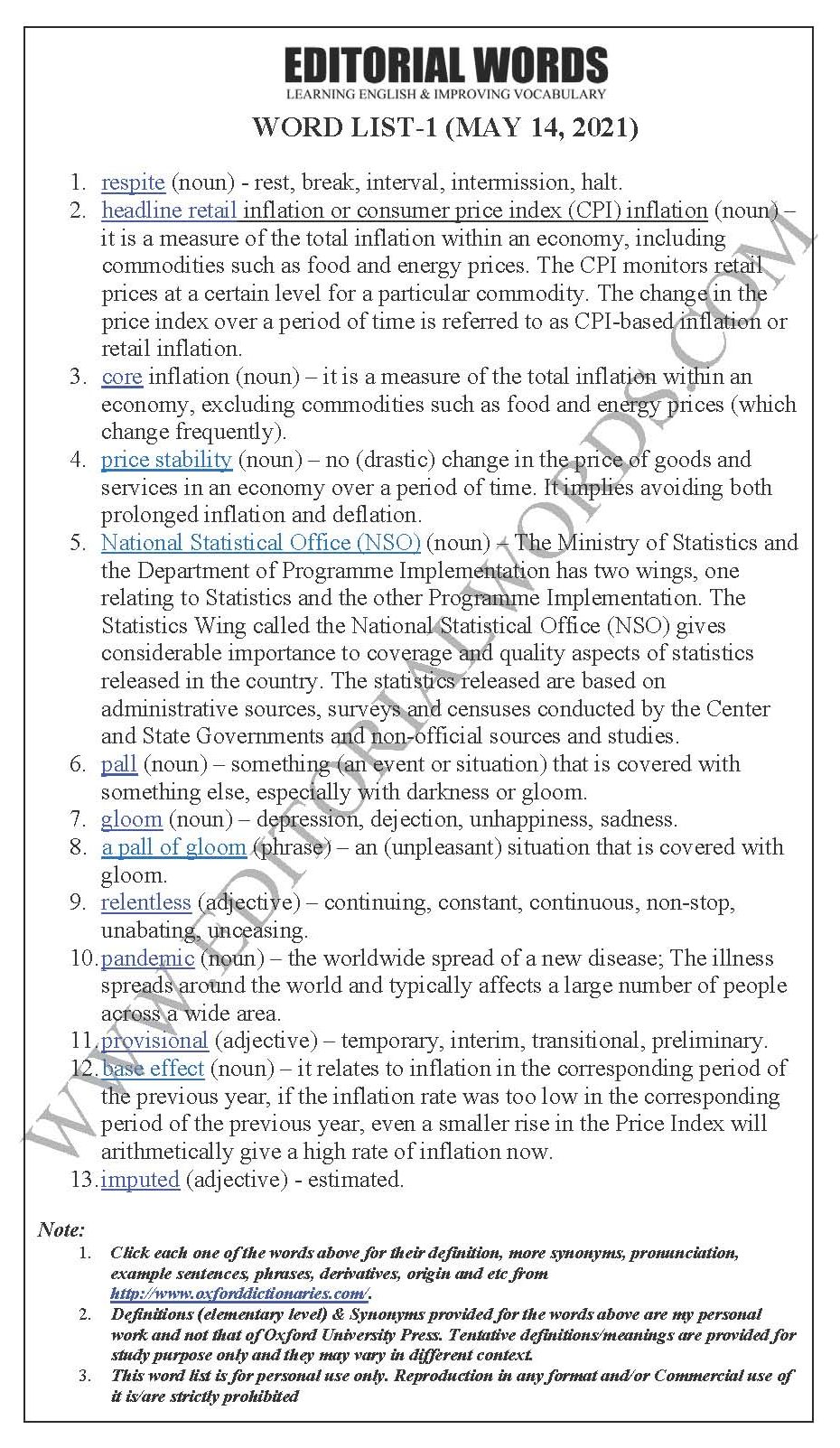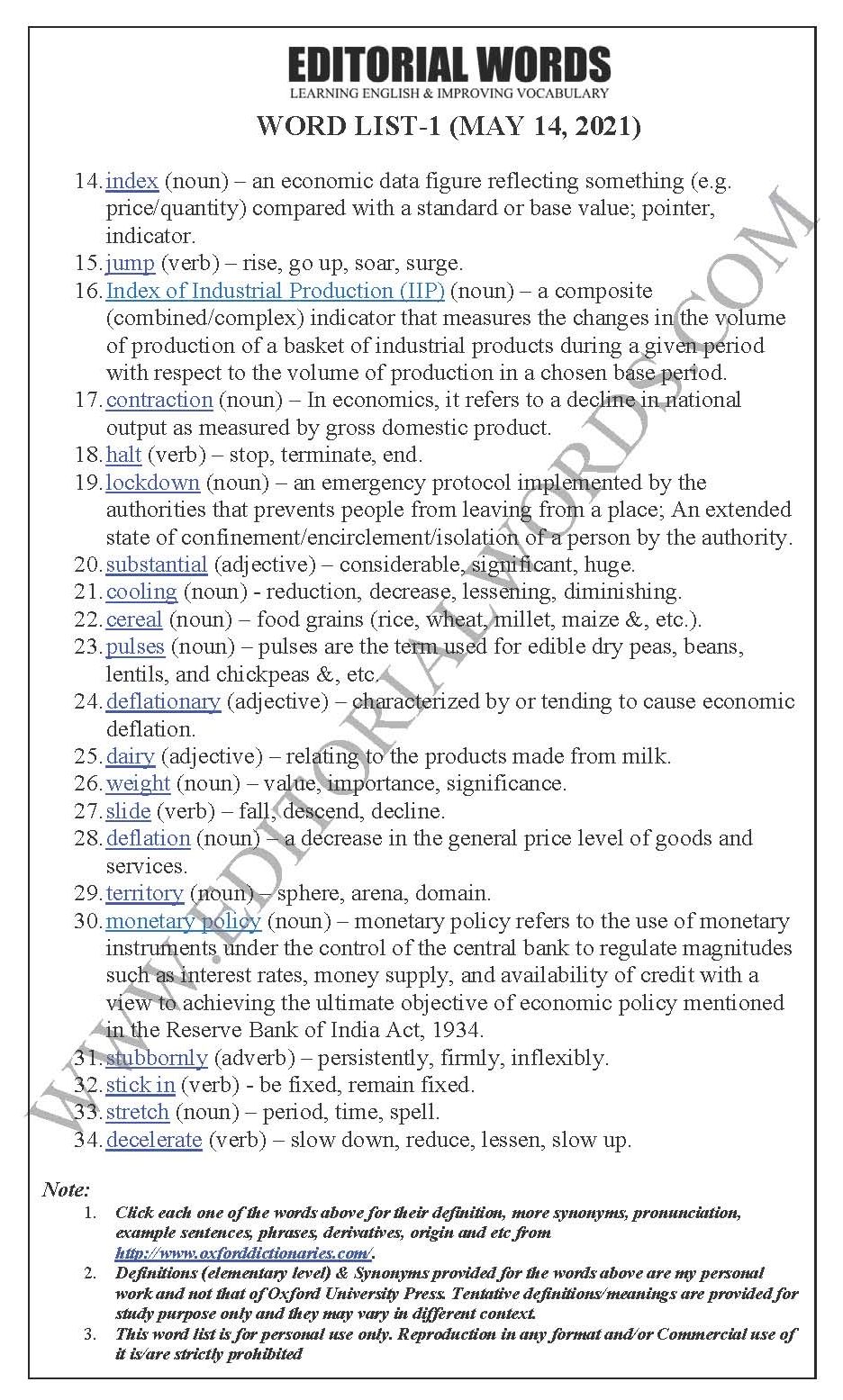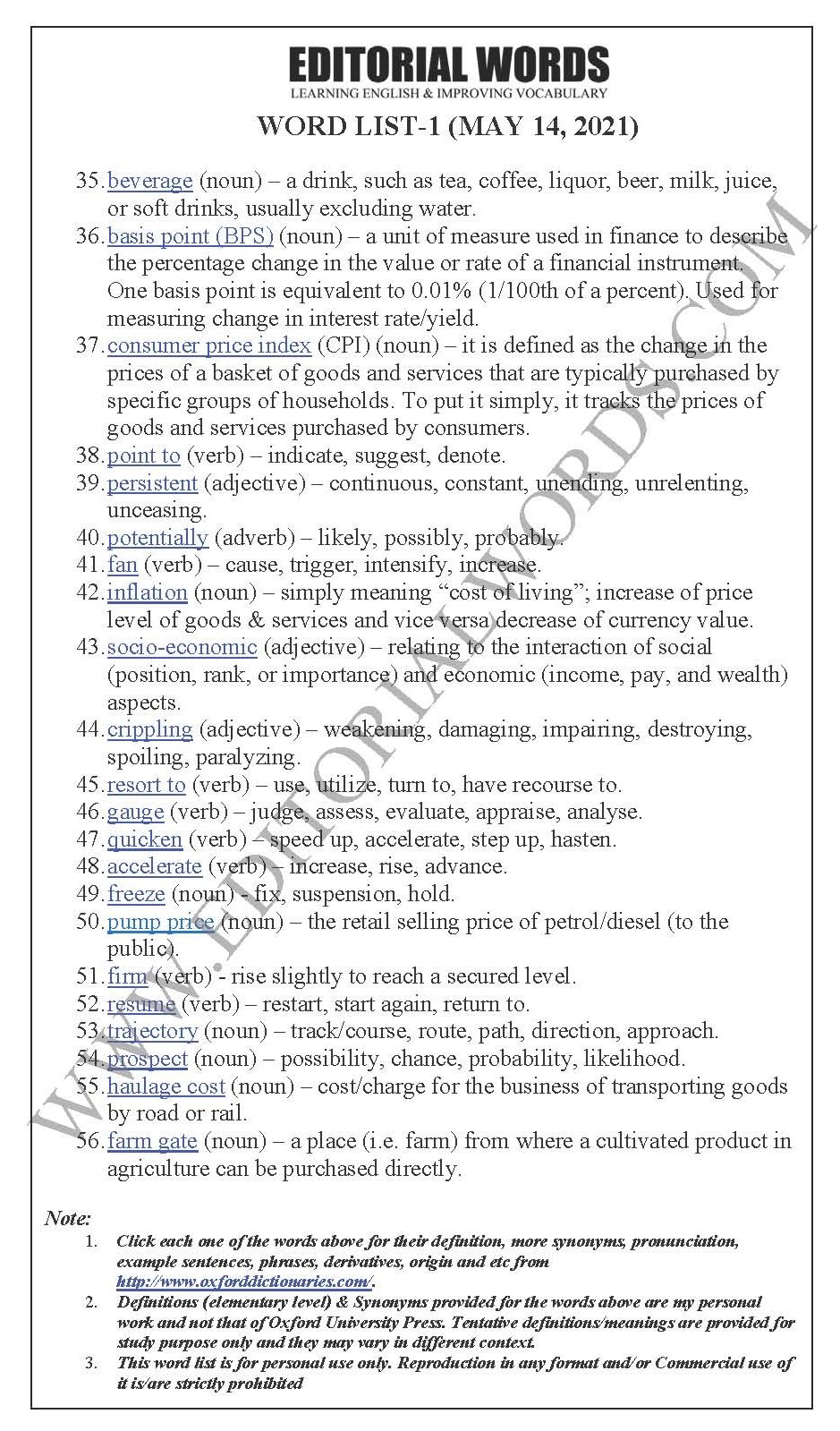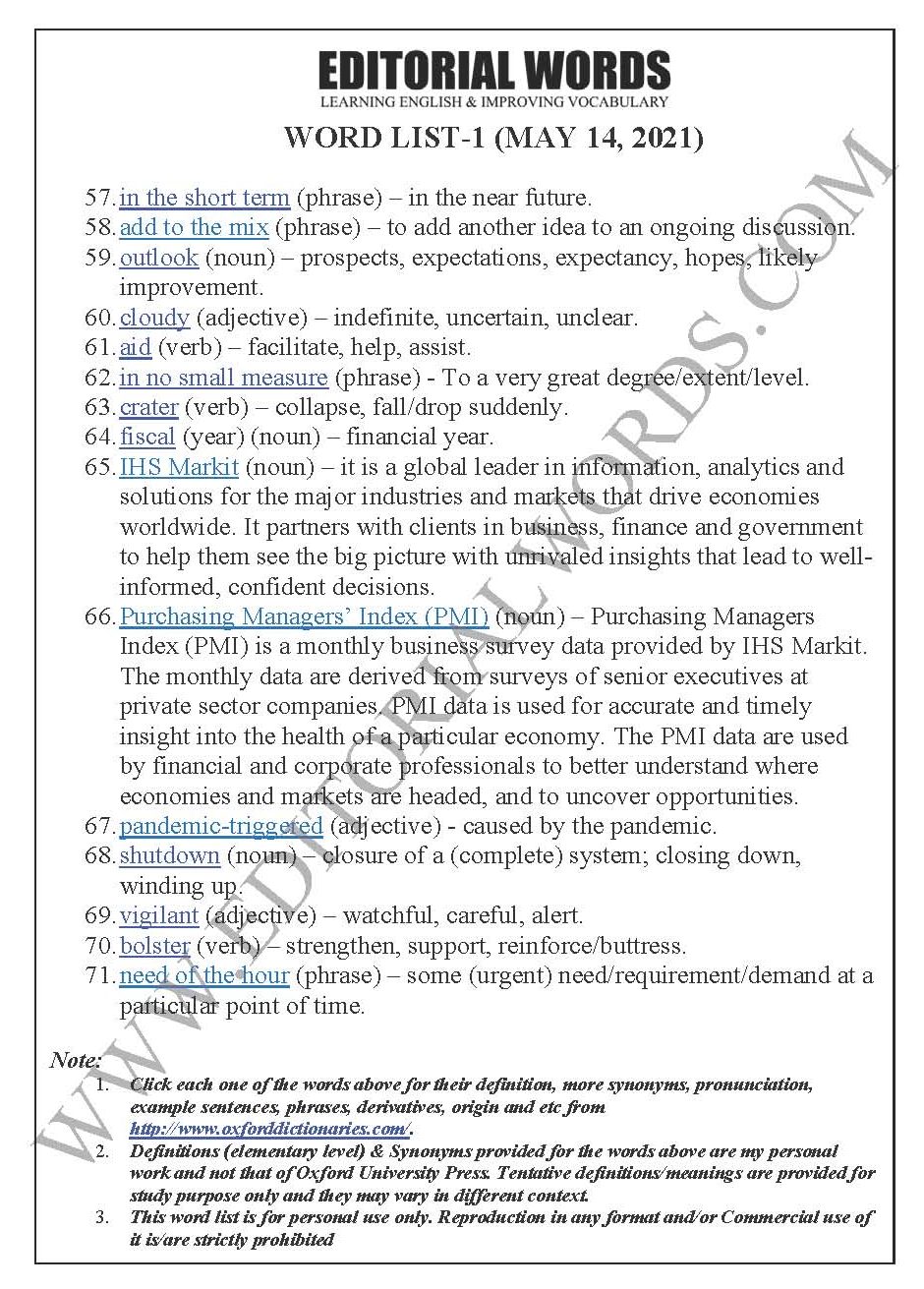The Hindu Editorial (Temporary respite) – May 14, 2021
The latest retail inflation and industrial output data from the National Statistical Office (NSO) offer some relief from the pall of gloom cast by the relentless second wave of the COVID-19 pandemic. For further reading, visit “The Hindu”. Below is today’s word list-1 for The Hindu Editorial (Temporary respite) – May 14, 2021.
To read this article, click here.
This preview is provided here with permission.
Courtesy: The Hindu
The Hindu Editorial (Temporary respite) – May 14, 2021:
- respite (noun) – rest, break, interval, intermission, halt.
- headline retail inflation or consumer price index (CPI) inflation (noun) – it is a measure of the total inflation within an economy, including commodities such as food and energy prices. The CPI monitors retail prices at a certain level for a particular commodity. The change in the price index over a period of time is referred to as CPI-based inflation or retail inflation.
- core inflation (noun) – it is a measure of the total inflation within an economy, excluding commodities such as food and energy prices (which change frequently).
- price stability (noun) – no (drastic) change in the price of goods and services in an economy over a period of time. It implies avoiding both prolonged inflation and deflation.
- National Statistical Office (NSO) (noun) – The Ministry of Statistics and the Department of Programme Implementation has two wings, one relating to Statistics and the other Programme Implementation. The Statistics Wing called the National Statistical Office (NSO) gives considerable importance to coverage and quality aspects of statistics released in the country. The statistics released are based on administrative sources, surveys and censuses conducted by the Center and State Governments and non-official sources and studies.
- pall (noun) – something (an event or situation) that is covered with something else, especially with darkness or gloom.
- gloom (noun) – depression, dejection, unhappiness, sadness.
- a pall of gloom (phrase) – an (unpleasant) situation that is covered with gloom.
- relentless (adjective) – continuing, constant, continuous, non-stop, unabating, unceasing.
- pandemic (noun) – the worldwide spread of a new disease; The illness spreads around the world and typically affects a large number of people across a wide area.
- provisional (adjective) – temporary, interim, transitional, preliminary.
- base effect (noun) – it relates to inflation in the corresponding period of the previous year, if the inflation rate was too low in the corresponding period of the previous year, even a smaller rise in the Price Index will arithmetically give a high rate of inflation now.
- imputed (adjective) – estimated.
- index (noun) – an economic data figure reflecting something (e.g. price/quantity) compared with a standard or base value; pointer, indicator.
- jump (verb) – rise, go up, soar, surge.
- Index of Industrial Production (IIP) (noun) – a composite (combined/complex) indicator that measures the changes in the volume of production of a basket of industrial products during a given period with respect to the volume of production in a chosen base period.
- contraction (noun) – In economics, it refers to a decline in national output as measured by gross domestic product.
- halt (verb) – stop, terminate, end.
- lockdown (noun) – an emergency protocol implemented by the authorities that prevents people from leaving from a place; An extended state of confinement/encirclement/isolation of a person by the authority.
- substantial (adjective) – considerable, significant, huge.
- cooling (noun) – reduction, decrease, lessening, diminishing.
- cereal (noun) – food grains (rice, wheat, millet, maize &, etc.).
- pulses (noun) – pulses are the term used for edible dry peas, beans, lentils, and chickpeas &, etc.
- deflationary (adjective) – characterized by or tending to cause economic deflation.
- dairy (adjective) – relating to the products made from milk.
- weight (noun) – value, importance, significance.
- slide (verb) – fall, descend, decline.
- deflation (noun) – a decrease in the general price level of goods and services.
- territory (noun) – sphere, arena, domain.
- monetary policy (noun) – monetary policy refers to the use of monetary instruments under the control of the central bank to regulate magnitudes such as interest rates, money supply, and availability of credit with a view to achieving the ultimate objective of economic policy mentioned in the Reserve Bank of India Act, 1934.
- stubbornly (adverb) – persistently, firmly, inflexibly.
- stick in (verb) – be fixed, remain fixed.
- stretch (noun) – period, time, spell.
- decelerate (verb) – slow down, reduce, lessen, slow up.
- beverage (noun) – a drink, such as tea, coffee, liquor, beer, milk, juice, or soft drinks, usually excluding water.
- basis point (BPS) (noun) – a unit of measure used in finance to describe the percentage change in the value or rate of a financial instrument. One basis point is equivalent to 0.01% (1/100th of a percent). Used for measuring change in interest rate/yield.
- consumer price index (CPI) (noun) – it is defined as the change in the prices of a basket of goods and services that are typically purchased by specific groups of households. To put it simply, it tracks the prices of goods and services purchased by consumers.
- point to (verb) – indicate, suggest, denote.
- persistent (adjective) – continuous, constant, unending, unrelenting, unceasing.
- potentially (adverb) – likely, possibly, probably.
- fan (verb) – cause, trigger, intensify, increase.
- inflation (noun) – simply meaning “cost of living”; increase of price level of goods & services and vice versa decrease of currency value.
- socio-economic (adjective) – relating to the interaction of social (position, rank, or importance) and economic (income, pay, and wealth) aspects.
- crippling (adjective) – weakening, damaging, impairing, destroying, spoiling, paralyzing.
- resort to (verb) – use, utilize, turn to, have recourse to.
- gauge (verb) – judge, assess, evaluate, appraise, analyse.
- quicken (verb) – speed up, accelerate, step up, hasten.
- accelerate (verb) – increase, rise, advance.
- freeze (noun) – fix, suspension, hold.
- pump price (noun) – the retail selling price of petrol/diesel (to the public).
- firm (verb) – rise slightly to reach a secured level.
- resume (verb) – restart, start again, return to.
- trajectory (noun) – track/course, route, path, direction, approach.
- prospect (noun) – possibility, chance, probability, likelihood.
- haulage cost (noun) – cost/charge for the business of transporting goods by road or rail.
- farm gate (noun) – a place (i.e. farm) from where a cultivated product in agriculture can be purchased directly.
- in the short term (phrase) – in the near future.
- add to the mix (phrase) – to add another idea to an ongoing discussion.
- outlook (noun) – prospects, expectations, expectancy, hopes, likely improvement.
- cloudy (adjective) – indefinite, uncertain, unclear.
- aid (verb) – facilitate, help, assist.
- in no small measure (phrase) – To a very great degree/extent/level.
- crater (verb) – collapse, fall/drop suddenly.
- fiscal (year) (noun) – financial year.
- IHS Markit (noun) – it is a global leader in information, analytics and solutions for the major industries and markets that drive economies worldwide. It partners with clients in business, finance and government to help them see the big picture with unrivaled insights that lead to well-informed, confident decisions.
- Purchasing Managers’ Index (PMI) (noun) – Purchasing Managers Index (PMI) is a monthly business survey data provided by IHS Markit. The monthly data are derived from surveys of senior executives at private sector companies. PMI data is used for accurate and timely insight into the health of a particular economy. The PMI data are used by financial and corporate professionals to better understand where economies and markets are headed, and to uncover opportunities.
- pandemic-triggered (adjective) – caused by the pandemic.
- shutdown (noun) – closure of a (complete) system; closing down, winding up.
- vigilant (adjective) – watchful, careful, alert.
- bolster (verb) – strengthen, support, reinforce/buttress.
- need of the hour (phrase) – some (urgent) need/requirement/demand at a particular point of time.
Note:
1. Click each one of the words above for their definition, more synonyms, pronunciation, example sentences, phrases, derivatives, origin and etc from http://www.oxforddictionaries.com/.
2. Definitions (elementary level) & Synonyms provided for the words above are my personal work and not that of Oxford University Press. Tentative definitions/meanings are provided for study purpose only and they may vary in a different context.
3. This word list is for personal use only. Reproduction in any format and/or Commercial use of it is/are strictly prohibited.
The Hindu Editorial (Temporary respite) – May 14, 2021:




“Phrasal Verbs” We Learnt Last Week
“Idioms & Phrases” We Learnt Last Week
“Important Definitions” We Learnt Last Week
Recent Word Lists For The Hindu Editorial Articles

Be the first to comment